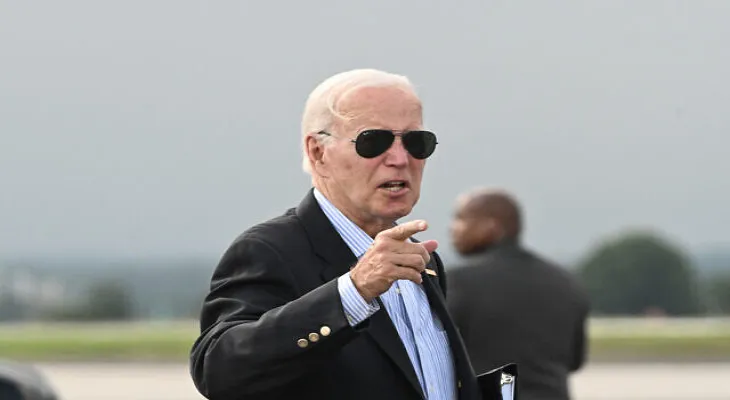Search here
Newspaper
Search here

Arab Canada News
News

Published: August 19, 2024
U.S. President Joe Biden said that a ceasefire in Gaza is still possible, despite the blame game between Israel and Hamas, as U.S. Secretary of State Antony Blinken arrived in Tel Aviv to push for an agreement.
Biden told reporters after spending the weekend at Camp David that negotiations are still ongoing and that "we will not give up," adding that the agreement "is still possible."
In a related context, after a three-hour meeting with U.S. Secretary of State Antony Blinken on Monday, Israeli Prime Minister Benjamin Netanyahu issued a statement publicly supporting the latest U.S. "bridge proposal" presented to Israel and conveyed to Hamas at the end of talks in Doha last week.
The Prime Minister's Office stated in a press release in Hebrew and English: "The Prime Minister affirmed Israel's commitment to the current U.S. proposal regarding the release of our hostages, which takes into account Israel's security needs, which he strongly insists on."
This statement marked the first time Netanyahu publicly endorsed the last U.S. formula.
On Saturday, Israel cautiously welcomed the new U.S. proposal. The Prime Minister's Office issued a statement at that time saying that the proposal "contains components acceptable to Israel."
Hamas rejected the U.S. formula on Sunday evening. In its statement, Hamas accused Netanyahu of "setting new conditions and demands" to frustrate the talks and prolong the war in Gaza.
The group also claimed that the latest U.S.-backed text aligns with Israel's demands.
The proposal, designed by the U.S. to enable completion of a hostages-for-ceasefire agreement by the end of this week, aims to resolve disputes regarding the continued deployment of Israeli forces along the border between Gaza and Egypt and in the Netzarim corridor in central Gaza, among other points of contention.
Channel 12 News reported on Monday evening that the U.S. proposal calls for "some type" of continued Israeli presence in the Philadelphi route along the border with Egypt. However, it added that Israeli negotiators informed Netanyahu that this is unacceptable to Hamas and that there would be no agreement if he insisted on it. On Saturday, several Hebrew media outlets, including Channel 12, reported that the bridge proposal does not include an Israeli presence on the Philadelphi route, nor a mechanism in central Gaza to prevent Hamas forces from moving north within the territory, as Netanyahu also demanded.
According to the Lebanese newspaper Al-Akhbar on Monday, Israel agreed to gradually reduce the number of soldiers deployed along the Philadelphi route, while Cairo agreed in return not to set a timeline for the complete withdrawal of forces.
Egyptian officials insisted on the need for a full withdrawal to be implemented as soon as possible, according to a source familiar with the talks quoted by Al-Akhbar. Egypt has asked U.S. negotiators to expedite the delivery of equipment designated to secure the border route and pledged to "work to ensure that there are no tunnels operating beneath it" that could be used to smuggle weapons into Gaza.
In addition to demanding a continuous presence of Israeli defense forces along the border between Egypt and Gaza and a mechanism to prevent Hamas fighters from moving north within the enclave, Netanyahu also insisted that Israel retain the right to resume fighting against Hamas to achieve the declared goals of the war—securing the release of all hostages and destroying Hamas.
It is unclear how the yet-to-be-published U.S. "bridge proposal" seeks to address these issues.
An Israeli official told The Times of Israel that Netanyahu informed Blinken in their meeting—described by his office as "positive"—that he would send senior negotiators to a summit in Cairo later this week.
The team will be led by Mossad chief David Barnea, Shin Bet director Ronen Bar, and the Israeli Defense Forces' hostage negotiator Nitsan Alon.
Earlier on Monday, before his meeting with Blinken, President Isaac Herzog directly blamed Hamas for the failure to reach an agreement on the hostages.
Herzog said, "People need to understand that it starts with Hamas's refusal to move forward," adding, "We are simply still hoping very much that we can move forward with the negotiations that the mediators are conducting."
Blinken noted that this is a "critical moment, perhaps the best, and maybe the last opportunity to bring the hostages home, achieve a ceasefire, and put everyone on a better path to lasting peace and security."
However, the minister did not blame Hamas: "It's time to do that. It's also time to make sure that no one takes any steps that would hinder this process. So, we are looking to ensure there is no escalation, no provocations, and no actions that could in any way take us away from completing this deal, or escalate the conflict elsewhere and more intensely."
Blinken emphasized, in what was widely seen as an indirect message to Netanyahu, "It's time for everyone to get to yes and not look for any excuses to say no."
Blinken is scheduled to meet with Defense Minister Yoav Gallant in Tel Aviv later on Monday, before heading to Egypt.
Comments